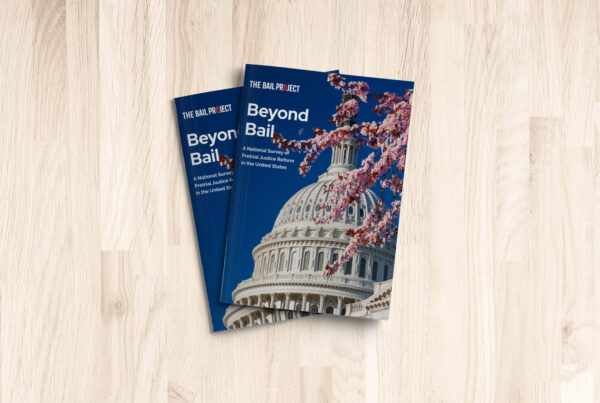With nearly 2 million people behind bars at any given time, the United States has the highest incarceration rate of any country in the world, costing taxpayers $182 billion each year. Given the scale of this problem, Americans deserve to have as much information as possible about this crisis.
While we know a good amount about what happens after someone is convicted, data on what happens at the front door of the criminal justice system before conviction is glaringly missing. Without sufficient data on the time between arrest and case resolution, policymakers and community members alike are in the dark about how to improve their pretrial systems.
The public lack of knowledge about pretrial decisions and their results can be surprising. For example, we often don’t have any information about those who courts require to pay bail for their release. And some data is simply locked away – prosecutors’ offices rarely grant public access to their policies, charging practices, or case results. Even when a jurisdiction does make pretrial data available, it is often quite limited. For example, we know that jails reported 7.3 million admissions from mid-2021 to mid-2022; but we don’t know exactly how many of those individuals are there because they cannot afford cash bail.
At The Bail Project, we understand the impact of high-quality data. Since 2018, we have provided free bail assistance to 29,356 individuals in more than 30 jurisdictions who could not afford to pay the cash bail set as a condition for their release. Once our clients are free, we provide court reminders, transportation to court, and referrals to voluntary services, if needed. We’ve prevented 1,190,490 days of incarceration and saved taxpayers over $92 million. As a result, our clients have returned to 91% of their court dates. Because our services are free of charge and our clients have none of their own money on the line, our work demonstrates how unnecessary cash bail is. By collecting and analyzing our own data, we know that The Bail Project’s Community Release with Support model works, and is one that jurisdictions across the country should emulate.
To make pretrial systems effective, efficient, and fair, we need to pass laws that require the statewide collection and analysis of data so that future reforms are based on evidence. Comprehensive, publicly available data provides a complete understanding of the system and how to improve it. This benefits everyone: stakeholders, such as jail administrators, can identify how best to address jail overcrowding. Judges and prosecutors can address long case processing delays. Policymakers can appropriately fund proven alternatives to jail. Advocates and legislators can work together to pass bills that strengthen the pretrial system overall.
While the vast majority of states do not require robust data collection, analysis, and publication, some states have recognized the power of data and passed laws to mandate data collection from pretrial systems.
- In 2018, Florida lawmakers passed a law to establish a statewide criminal justice system database that would house data from local jails, prosecutors, public defenders, and criminal courts, allowing the public to track pretrial decisions more accurately.
- The next year, the Colorado Legislature created a jail-specific database.
- In 2020, Utah required its prosecutors to submit regular data from their offices in order to empower state policymakers to make data-driven decisions.
Hope remains as states continue to consider the incredible value of statewide and public data on pretrial systems.
- In February 2024, Oklahoma’s MODERN Justice Task Force released a report highlighting the fragmented nature of their existing data collection mechanisms. The Task Force emphasized the need for a unified statewide system and called on lawmakers to continue data collection and analysis.
- In Michigan, legislators are considering a bill package that would, in part, require courts to submit information on bond decisions and their results.
Good data is key to the success of pretrial systems and reforms underway across the country. That’s why The Bail Project is working with jurisdictions and policymakers nationwide to advance pretrial data collection. We will continue to seek out accurate and complete information in order to protect the presumption of innocence. This ensures a pretrial system that works for everyone, not just those with money.
Thank you for reading and your willingness to engage in a complicated and urgent issue. In addition to providing immediate relief by offering bail assistance, we at The Bail Project are working to advance systemic change. Policy change doesn’t happen without the support of people like you. If you found value in this article, please consider taking action today by donating.












